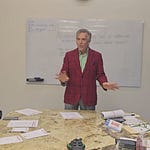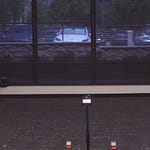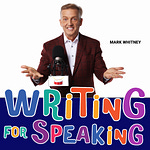Mark Whitney’s Comments & Analysis In Response To Paris’ Icebreaker Speech
AI Generated Transcript
Speaker1:
[0:00] We have one of our newest members, Paris, who will be giving a five to seven minute speech. Is that correct? Five to seven minute speech about when the model breaks down. I don't know if this is a human model or a mathematical model or both.
Speaker0:
[0:13] Yeah, it's her icebreaker.
Speaker1:
[0:15] It's her icebreaker. Yes. So, oh, great. So please help me in welcoming Paris with when the model breaks down.
Speaker0:
[0:27] Thank you, everyone. I usually begin my speeches with turning red, having a racing part and trembling feet. But today I'm going to collect all of my power to avoid those. Let's see how that will work. I was born and raised in Iran. My mom was a nurse. My dad was an accountant.
Speaker0:
[0:53] He also had a degree in Russian. Later he got an MBA. And long before computers were common, he taught himself programming on a Commodore 64.
Speaker0:
[1:08] And nowadays, his passion is learning about Persian epic poetry. So he's the kind of person who always is thirsty to learn and thinks of life as a never-ending school project. From an early age, he encouraged my sister and me to be scientists. At age 12, I tested into a gifted school, and I was placed among bright students and received a very good education. At 18, I ranked 40th among more than 150,000 participants in Iran's National and Trans-Example University. And I was placed in the top university in Iran in a very competitive major, electrical engineering. Again, I was among the best of the best. All those years, I received training on being a strong student, especially in science and math. But I missed on other important life skills. I remember my sister and I routinely skipped family parties to stay at home and study. I remember my dad once told me that people with high IQ have a hard time communicating with others. and I took that as a fact.
Speaker0:
[2:24] After college, I followed the path of my peers to apply abroad for graduate school.
Speaker0:
[2:30] I got an admission from Northeastern University in Boston. At age 22, I left my country, my family, and my first love, by the way, my classmate, to go to Boston. And.
Speaker0:
[2:48] Again, I was among very good, similar, like-minded nerds at college. After six years of being long, oh, by the way, my boyfriend, my love, got an admission from University of California in San Diego. So as you can imagine, we were placed in the opposite coasts in the U.S., practically with the maximum distance two people have in the country. I finished my education after six years of long-distance relationship with my boyfriend. I moved to San Diego with my Ph.D., and we got married, and I landed my first job as a data scientist. Finally, it felt like my dad's long wish was coming true. I was becoming a scientist. Um.
Speaker0:
[3:47] Soon after that, I landed my first job. Oh, I talked about my job. Seven years ago, right before the Memorial Day weekend, my, our first child was born. We hired a babysitter so I could push forward in my career. Um, and again, I worked with engineers like myself, many of them international. So I was still inside my comfort zone until the pandemic happened. Boom. I was suddenly thrown out of my comfort zone. It felt like all of the skills that I had worked all my life to gain no longer mattered. I lost my babysitter. I lost my housecleaning lady, all of my support system. And I tried to work harder to make things work. But I was on the edge of a burnout. Then another boom, September 2020, my little sister at age 33 was diagnosed with aggressive breast cancer, which was, by the way, the first one in our family history.
Speaker0:
[4:51] And that was my wake-up call. I realized that to survive, I had to pause and breathe.
Speaker0:
[5:04] I joined the great resignation wave. I quit my job at Qualcomm to become a stay-at-home mom. Ever since, I've been working on making more women friends. I started a hiking club. After we had our second child, I started a community for Iranian moms of newborns in San Diego. And today I'm practicing skills that I never learned as a child as a teen or even as a young adult and those are communication, making eye contact, active listening and giving a speech in front of an audience, that's why I'm here today.
Speaker1:
[5:49] Thank you way to do it. Awesome. Reward yourself after. Give yourself a little reward after the meeting. Seriously, reinforce that.








